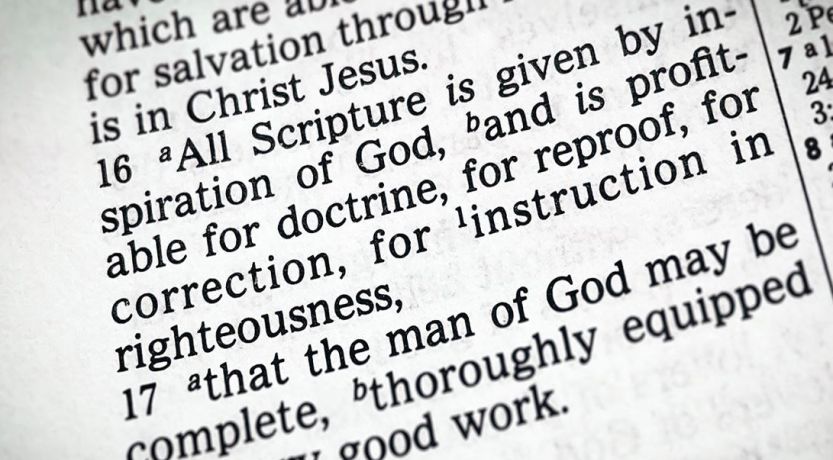The Meaning of 2 Timothy 3:16: “All Scripture Is Given By Inspiration of God”?
Is the Bible relevant to you? Why should you study the Bible? Paul gives four reasons in 2 Timothy 3:16-17. What does 2 Timothy 3:16 mean for Christians?

What does 2 Timothy 3:16 say?
"All Scripture is given by inspiration of God, and is profitable for doctrine, for reproof, for correction, for instruction in righteousness ..."
It is, after all, an old book—and a very old one at that.
Combine that with the fact that it was written over the course of perhaps 1,500 years by several different authors—some with strange, difficult-to-pronounce names like Habakkuk—in sentences that sometimes sound more like riddles.
And does the Bible have any relevance in the modern era at all?
Truth be told, I believe the Bible is more relevant to you than what meets the eye.
Why study the Bible?
One of the most compelling arguments for studying the Bible can be found in a single sentence in the Bible itself.
Paul wrote, “All Scripture is given by inspiration of God, and is profitable for doctrine, for reproof, for correction, for instruction in righteousness, that the man of God may be complete, thoroughly equipped for every good work” (2 Timothy 3:16-17).
The first clause in that verse should make us pause: “All Scripture is given by inspiration of God” (emphasis added throughout).
In no uncertain terms, this verse reveals the primary reason the Bible is unlike any other book in the world. It was inspired by God Himself, the Creator of the universe—your Creator.
He is the real author.
And He would like you to listen to what He has to say. He would, in fact, like the whole world to listen to what He has to say. What Paul wrote in 2 Timothy 3:16-17 makes one of God’s strongest cases for studying the Bible—in just 35 words (in English).
Let’s dig deeper into this verse and explain the four reasons it provides for studying the Bible.
Reason 1: The Bible is “profitable for doctrine”
It would be odd to hear somebody exclaim, “I have a doctrine for you today!”
It might be less strange to hear, “I have a teaching for you today!” which is basically the modern-day equivalent.
The Bible is profitable for teaching, for getting answers.
What does it teach?
There is really no shortage of topics covered in Scripture. As it turns out, the Bible provides insight on a variety of subjects, like health, finances, interpersonal relationships, communication, how to be a man, how to be a woman, what is morally right and wrong, how to live life, and so on.
Bible study should be a regular part of a Christian's life. 
The Bible is the only book that answers the question about the real purpose of human existence. Philosophers, religious leaders, politicians, thinkers—some of the world’s greatest minds—have tried and failed to answer that question.
Why is that? Frankly, it’s because they tried to solve the question using their own ideas rather than looking to God’s Word for His answers.
The Bible reveals the truth about questions like: What’s the purpose of life? Why are you here? Why did God create you? How would He like you to live your life? The Bible is profitable for those doctrines. The Bible should be the first place we go for answers.
We do offer a lot of resources to help you learn what the Bible says about these topics. Read our article “Why Were You Born?” to learn more about the purpose of human life.
Reason 2: “for reproof”
The word reproof is translated from the Greek word elegcho, which means “to convict, refute, confute, generally with a suggestion of the shame of the person convicted” (Thayer’s Greek Lexicon).
Studying the Bible means occasionally being reproved—convicted, exposed.
That is, of course, assuming we approach the Bible with the right attitude. The one “who trembles at My Word,” as described in Isaiah 66:2, is the person who takes the Bible seriously, with reverence and awe.
When we read the Bible with this mind-set, we will undoubtedly feel pricked—as if our toes were being stepped on. But God designed it that way, and it’s partly why the Bible is an absolute must-read.
If we read it honestly and carefully, the Bible becomes the measuring stick for our thoughts, conduct and behavior. God intended for us to see ourselves in contrast to His standards and expectations.
Think about a knife.
Imagine taking a knife and slicing down the center of an apple. With both halves of the fruit in your palms, what do you see?
You might see the fruit’s meat, core and seeds.
Simply put, the knife revealed information about the apple that you would not have discovered otherwise—it showed you the contents, the insides.
The Bible uses a similar metaphor to describe itself. Notice Hebrews 4:12: “For the word of God is living and powerful, and sharper than any two-edged sword, piercing even to the division of soul and spirit, and of joints and marrow, and is a discerner of the thoughts and intents of the heart.”
Imagine a book so powerful that it can cut through as many layers as necessary in order to reach the deepest, most secret part of your very being—the heart and mind—and show you what is there. And, more importantly, what you need to change.
That’s the Bible.
To learn more about the humble approach we need to have as we study God’s Word, read “What Does God Require of You? Walk Humbly.”
Reason 3: “for correction”
Correction is the next logical step after reproof.
God is not in the business of making people feel bad just because. He has an end goal in mind.
According to 2 Timothy 3:16-17, the Bible was designed in such a way that it can shed light on our faults and shortcomings—that is, reprove us—and then correct us.
The word for “correction” here is epanorthosis, which means “restoration to an upright or a right state; correction, improvement.”
You may wonder just how important correction really is—after all, who does it hurt if you choose not to receive correction?
The Bible is for correction because God loves us. He wants us to use His Word to keep ourselves on His straight and narrow path.
Consider this example.
In the field of air navigation there is a rule of thumb known as the 1 in 60 rule. The rule basically states that for every degree a plane deviates from its intended course, it will miss its ultimate destination by 1 mile for every 60 miles flown.
If your target is 1 foot away from you and your trajectory is 1 degree off, the distance between you and your destination will be a negligible 0.2 inches—small, right? But the further you travel with the deviation, the larger the distance will become. If you were to fly 3,000 miles with even just a 1 degree miscalculation, you would end up in a very different place than what you had intended.
The same can be said about our lives. If God were to overlook the role of correction and say nothing about our errors, the distance between us and the straight and narrow path—where peace and protection are found—would widen over time.
Sin, or veering off course by even a single degree, will take us to places we never expected to find ourselves.
The Bible is for correction because God loves us. He wants us to use His Word to keep ourselves on His straight and narrow path (Matthew 7:13-14).
To learn more about the narrow path of God’s way, read “What Is the Narrow Gate Jesus Talked About?”
Reason 4: “for instruction in righteousness”
Righteous is one of those words that sounds almost medieval, perhaps making you think of a dignified knight who kept his shoulders back and his back straight.
The term simply means “right,” and it can be used to describe someone who does the right thing. A righteous person is someone who is distinguished by his or her right behavior or right conduct. However, when you add “-ness” to “righteous,” you move from adjective territory to noun territory. The word becomes “righteousness,” and that can best be defined as the condition of right standing with God, or acceptability to God.
This implies that in order to be in a state of righteousness before God, you have to meet Him on His terms, not on someone else’s.
In order to be in a state of righteousness before God, you have to meet Him on His terms, not on someone else’s.
There are two kinds of righteousness: true righteousness and false righteousness. Where we are depends on whose terms and conditions we have agreed to. Do we judge our righteousness by the standards of the world we live in? Or do we rely on God’s standards? Whose standards really matter?
This very question was a hot topic among Jews and Christians in the first century.
Paul, inspired by God, explained, “For they [Jews] being ignorant of God’s righteousness, and seeking to establish their own righteousness, have not submitted to the righteousness of God” (Romans 10:3).
There is a way to avoid being ignorant of God’s righteousness and establishing your own righteousness, and that way is found in the Word of God.
God’s definition of righteousness is in Psalm 119:172: “All Your commandments are righteousness.”
The Bible is the only place where we can find all His commandments. Would you like to be in right standing before God? Would you like to know how to receive His blessings, grace and favor?
For instruction in righteousness, look no further than the Bible.
To dig deeper into God’s commandments and how you can apply them to your life, read our articles on “The 10 Commandments and God’s Way of Life.”
How can I apply 2 Timothy 3:16-17?
In verse 17, Paul concludes his thought with the statement: “That the man of God may be complete, thoroughly equipped for every good work.”
The Bible is God’s instruction manual for mankind, and as Creator and Designer, He included every principle we would need for the things we face in life. And, because the wisdom of the Bible originates from a timeless God, it is, in fact, timeless in its application to human beings. It’s for everyone, everywhere, in every generation.
But even if you are convinced of the four reasons you should study the Bible, you still might not find it easy to read.
The Bible can indeed be challenging, especially when you are clueless about where to start.
So, we here at Life, Hope & Truth would like to help.
That is why we offer the Life, Hope & Truth Bible Study Course, a resource designed to help you establish a starting point in your Bible study.
This course is designed to help you see the Bible in panoramic view. It covers some of the most important topics and themes of the Bible in 11 interactive and easy-to-follow lessons.
You will discover who God is, who Christ is, what the true gospel is, the purpose of human existence, and many other eye-opening truths.
Enroll in the course now and start putting the truths of 2 Timothy 3:16 into practice in your life.
Date Posted: January 31, 2022



